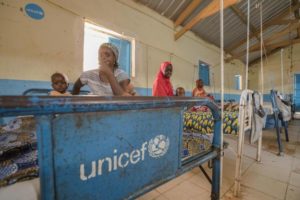The EU and UNICEF to ensure continuity of life-saving care for malnourished children in Niger
UNICEF receives additional USD 2.6 million funding support from the EU Humanitarian Aid (ECHO) to ensure that children suffering from severe acute malnutrition receive quality care and treatment amidst the Covid-19 pandemic context. The country estimates that the number of children suffering from severe acute…
UNICEF receives additional USD 2.6 million funding support from the EU Humanitarian Aid (ECHO) to ensure that children suffering from severe acute malnutrition receive quality care and treatment amidst the Covid-19 pandemic context.
The country estimates that the number of children suffering from severe acute malnutrition will increase by 30% this year due to the impact of Covid-19 on the food security situation as well as on access of children and their mothers to appropriate care and basic health services.
“We are deeply worried about the crisis and the risk of it hitting harder some of the most vulnerable children and families. Extra efforts should be made to protect those most vulnerable,” says Dr. Félicité Tchibindat, UNICEF Representative in Niger.
This new contribution will support UNICEF and partners in their efforts to contribute to reducing the incidence of severe acute malnutrition and preventing mortality in children under five suffering from severe acute malnutrition while strengthening systems and building resilience in emergency-affected areas of Niger.
Support from the EU Humanitarian Aid (ECHO) will help UNICEF to improve early access and quality of severe acute malnutrition treatment through the procurement and provision of Ready-to-Use Therapeutic Food to health facilities in order to treat more than 36,000 children with severe acute malnutrition.
UNICEF will also support the delivery of a coordinated and integrated approach to addressing severe acute malnutrition in children by ensuring a continuum of nutrition care and support for children and mothers. Health staff and community health workers will receive training on Integrated Management of Acute Malnutrition, Infant and Young Child Feeding practices and screenings activities.
Malnutrition is a major threat to children’s survival and development in Niger. Despite recent efforts, severe acute malnutrition rates and burden remain extremely high. Over the past years, the rate of global acute malnutrition in under-five children has consistently remained above the 10% alert level. On average annually, 350-400,000 children under the age of five with severe acute malnutrition are admitted for treatment. New estimates show this figure may increase to 530,000 children this year due to the Covid-19 pandemic.
Amidst the pandemic, the situation is extremely worrying, with the number of hungry rising steadily as the crisis deepens, also pushing 2 million people in Niger into severe food insecurity.
“This is a critical moment for children. We are deeply grateful that the EU Humanitarian Aid has once again shown its commitment to the children of Niger. The pandemic and its aftershocks pose an enormous, but not insurmountable challenge. We will get through this together, for every child,” concludes Dr. Tchibindat.
